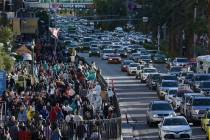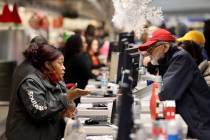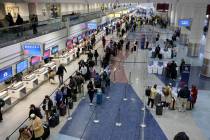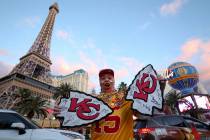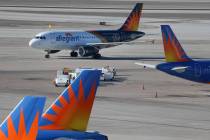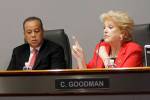Clark County sales tax revenue grew in November. Was that from Formula One?

Newly released sales tax figures from the state show that economic activity in November outpaced previous months, suggesting the depth of Formula One’s impact.
Taxable sales in Clark County reached $5.5 billion in November – the month that the region held the first Formula One Grand Prix – a 5.5 percent increase compared to the previous year, according to monthly taxable sales statistics from the Nevada Department of Taxation released Tuesday.
“What we know is that our hotel industry and the restaurant industry were up combined, and did pretty well,” said Jeremy Aguero, principal analyst with Las Vegas-based Applied Analysis. “As we compare it against the current fiscal year, really helped buoy the sales tax overall.”
The reports detail the expenditures subject to retail sales, not the taxes levied that go into state and county coffers. It includes taxable sales from other high-priced sectors like motor vehicle sales and development-related purchases. In the case of hospitality, it does not include gaming win but does include sales and other services a customer might buy and pay a sales tax on within a resort — most often food and beverage outlets.
In fact, the food services and drinking places sector, of which most hotel-casinos are categorized in this report, was up 8.6 percent annually to $1.1 billion in taxable sales.
Several Nevada economists said the data is significant because it falls in line with the expectations that the inaugural three-day international motorsport race would support the region’s overall economy. A preliminary economic impact report released on Jan. 24 found that visitors during Formula One week spent $561 million.
Total taxable sales for the county have grown since the pandemic faster than the pace of inflation, economists said. Tax receipts in November 2023 were 68 percent higher than November 2016 — the year in which visitor volume peaked for the region at nearly 43 million visitors. Meanwhile, inflation rose about 17 percent in that same period, Andrew Woods, director of the Center for Business and Economic Research at UNLV, said.
That suggests fewer visitors contributed to the higher sales tax rates, all while the region’s population grew. It’s a connection that can also be seen in the growing average daily room rates shown in monthly visitation reports, despite a stagnating visitor volume.
“This is in line with (the trend that) consumers are less sensitive to prices than they have in the past,” Woods said. “That’s been a pretty steady trend and partly why inflation has been as sticky as it’s been. As much as we don’t want to pay higher prices, we’re paying higher prices and we’re still buying things.”
Aguero and Woods said that higher spending trends typically suggest a pullback in consumer spending is coming. And though the taxable sales are higher for the county overall, Woods and Aguero both noted that individual businesses may not have could have seen record sales levels of their own.
“Just because people are paying more in hotel rooms, it may not spill over into the entire valley,” Woods said.
It’s something that Lisa Mayo-DeRiso, a consultant representing nine businesses in the resort corridor who say they lost millions in revenue from months of race-related road construction, is concerned about. She notes that some industries seemed to be huge winners during the month. For instance, taxable sales at clothing, accessory and shoe retailers were up 4,924.6 percent to $5.6 million.
“If you took out some of the industries that had nothing to do with F1, we might be at something different,” Mayo-DeRiso said. “I think that this tax report shows that when we evaluate this event, because it had an unusual and unprecedented impact on travel and access on our public roads, we have to look at this broader picture. When I look at other categories, I don’t see how F1 lifts all boats. We know it didn’t because of the people I’m working with who lost $23 million in the process.”
McKenna Ross is a corps member with Report for America, a national service program that places journalists into local newsrooms. Contact her at mross@reviewjournal.com. Follow @mckenna_ross_ on X.









